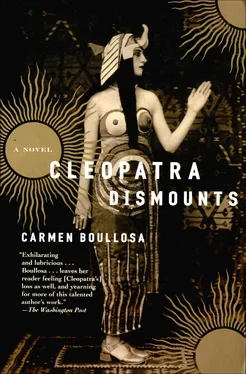On the edge of my bed, behind the fine netting, stood the handsome Severus, the general who had accompanied me to the doors of the royal palace. He held a pigeon in his hands. With him were Diomedes my secretary, the wise Demetrius, and Josephus, the captain of my personal guard. I was still hugging Charmian. Seeing me upset, Apollodorus had sat behind me and was massaging my neck and shoulders.
Severus was eyeing Apollodorus’s caress and my bare back. Then he lowered his gaze, gave the pigeon to Josephus, and went out.
Josephus took the message from the pigeon’s body. Diomedes spread it out and decoded it, with these comments. “Pompey, defeated by Julius Caesar at Pharsalia, has come to Egypt seeking aid and refuge. Logical enough, if he doesn’t take into account that Cleopatra is here precisely for sending him reinforcements. He disembarked and by himself, without his men, boarded a small boat that the boy-king sent to pick him up, trusting the boy-king’s word. They were passing by the lighthouse when Achilles traitorously stabbed him in the back. It was the Roman sword of Septimius that beheaded him. Caesar arrived hot on the heels and was welcomed with a ring and the head of Pompey. He wept. The lictors checked the streets of Alexandria and found pockets of resistance. A good number of soldiers have been killed in skirmishes and. . Caesar’s living in your palace, Cleopatra, and asks to see you.”
“There’s no time to lose,” I said, leaping out of bed. Charmian covered me with a tunic, fastening its ties and saying, “Calmly, child, calmly.”
“Yes, it’s essential,” said Josephus approvingly, “that you have an interview with Caesar.”
“Demetrius?”
Unlike his usual self, the wise counselor gabbled a rapid answer, as if his thoughts were tumbling over each other. “Pompey’s men. Yes. Must be waiting to assassinate you. No idea what Caesar’s up to. No dealings with him yet. Pompey our man. Clear to everybody. Taking both the Lagids as hostages? Could be. Then grab all Egypt. Could be. Just don’t know. Ought to provoke a showdown with Pompey’s men. If we can. No threats against Caesar. Not smart. Lucky for us he’s set himself up in Alexandria. But Alexandria’s hostile to him now. No doubt of that. Killing his men in ambushes. Now one at a time, but things will heat up. We’re outside the city. Like it or not, Caesar’s our man!”
“Josephus, how many men do we have at our disposal? Can we take on Cassius?”
“Cleopatra, Pelusium is already in the hands of Achilles. Right now, it’d be pure suicide.”
“We could raise an army here, get the fleet to join us, and attack by sea.”
“We don’t have time, Cleopatra. We’d leave everything wide open for Ptolemy.”
“Yes, you’re right, Josephus. So let get things plain. One, we can’t attack Cassius, because we don’t have enough soldiers. Two, we don’t have time on our side, so we can’t think of raising an army. Three, it’s risky but Cleopatra ought to see Caesar, because we need him as an ally. If Ptolemy gets him to take his side against us, we’re done for. Four, Ptolemy’s men are waiting for the queen to show so they can kill her.”
“Right, Demetrius. So. .”
“Josephus, my opinion is exactly the opposite of yours. Alexandria will be Caesar’s enemy. Ptolemy won’t be able to keep it calm. Time is on our side. We take our time recruiting an army, then we march against Ptolemy, and we get Caesar on our side.”
“I disagree. If we wait, Caesar gets chummy with Ptolemy. Why wouldn’t he? We delay in getting there and Caesar will help him against us.”
“Could be but. . I’m not a man of war and we’re dealing here with a war. How do we get Cleopatra to Caesar without Ptolemy’s men killing her? We can’t endanger the queen.”
“Cleopatra, a suggestion,” put in Apollodorus. “Remember how we used to play at making you invisible? That’s what we have to do now. You’ve got to get you to Caesar without any risk of Ptolemy’s men intercepting you.”
“But all entrances to the city are blocked off. They’re scared of you showing up there. They know they’ve got to stop you seeing Caesar,” said Josephus bluntly.
Guided by the methodical intelligence of Demetrius, we agreed on the following: With the army already under arms in Ascalon, we would advance toward Pelusium and engage Achilles. Meanwhile, those forces we had in place against Cassius would move against him, in the hope of dividing his superior forces. We would embark on a merchant ship in Barca and head to Alexandria as fast as possible. We would bribe the port officials to let us anchor in the Kings’ Harbor.
In the meantime, the levy would continue, to provide us with the necessary reinforcements. Josephus would stay in Cyrene.
The rest of the plan we would figure out en route to Alexandria. Now the important thing was not to waste time. As the poet says, “Time runs ahead and has no hair on the nape of its neck to hold it back.” We had to be installed on that merchant ship that same day and be ready to sail at dawn. If we hurried, there would be no time for anyone to sneak a message to Ptolemy about our plans.
Josephus rushed off to Barca to arrange for our trip.
I bade good-bye to the hospitable Carneades III, without divulging my plans to him. He put his army at my service and showed every sign of joy at the news that Josephus would be staying to recruit troops locally for the army of Cleopatra.
I sent Apollodorus and Charmian ahead to finish off the preparations at the port and then I galloped off to say good-bye to the Amazons. Half a dozen men from my personal guard accompanied me. The wise Demetrius also came along as he was dying to meet Amazons.
I had no plans to neglect my alliance with the Amazons. I wanted to ask them to embark on our warships. Instead of experienced veterans, I wanted Amazons there. I knew they would be itching to attack Alexandria with the advance guard and I’d have to be very persuasive to keep them in the rear. But I was not going to change my mind. What atrocities would they not get up to in my beloved Alexandria, planned by artists and inhabited by gods, these women possessed by martial frenzy? I was trusting that there’d be no need for them to do any actual fighting, if I could meet Caesar successfully and avert a battle between my army and Ptolemy’s infantry. But I would not be proposing my own idea but that of Cyrus, as documented by Xenophon. As Hippolyta honored Cyrus, I knew that she would recognize and respect his views.
Drawing near, I left my companions and went forward alone to warn the Amazons that men would be entering their camp. I was rehearsing my arguments about their place in my forces, determined to avoid offending them or leaving them feeling slighted, when suddenly, I heard curses and heart-breaking lamentations.
“I loved it so much!” one was saying.
“That’s what women must feel when they lose a child,” said another.
There followed more upsetting cries and I rose on my stirrups to see what the problem was.
They were gathered by the Temple of Demeter, some on horseback, others on foot, all of them naked. Their hands, faces, and breasts were covered in blood. They had sacrificed a horse, and as if in answer to my questions, they broke into a hymn:
The sun we worship and to him we bring
This horse. To heaven’s swiftest power
We offer now the swiftest of our things .
To heaven’s most beloved power we send
The most beloved of the things we own ,
On which we never war, our earthly sun ,
This horse . .
What I saw in Hippolyta’s hands appalled me; in her left hand was a knife, in the right the enormous purple penis of the horse. She was howling at having castrated the creature. The head with its blond mane lay on the ground, the body was dismembered. Behind me, another Amazon was leaning over the dismembered parts and interpreting the intestines. Hundreds of other Amazons, seated on horseback, were all menstruating; blood covered the horses’ backs and their own thighs. I retraced my steps. Out of the corner of my eye I glimpsed another horse, a fine animal, rearing and kicking against its reins. Its back was bathed in blood as were the legs of the rider. But a river of blood was pouring down the animal’s legs. It too had been castrated in readiness for sacrifice.
Читать дальше












